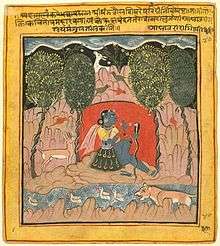Asavari
Asavari (IAST: Āsāvari) is a Hindustani classical raga. It belongs to the Asavari thaat and is performed in the morning hours.
 | |
| Thaat | Asavari |
|---|---|
| Type | Audava-Sampurna |
| Time of day | Late morning, 9–12 |
| Arohana | S R M P Ḏ Ṡ |
| Avarohana | Ṡ Ṉ Ḏ P M P Ḏ M P G̱ R S |
| Pakad | M P Ḏ M P G̱ R S |
| Vadi | Ḏ |
| Samavadi | G̱ |
| Similar | |
| Hindustani classical music |
|---|
| Concepts |
| Genres |
| Thaats |
In pre-Bhatkhande days this Asavari used the Komal Rishab instead of Shuddh Rishab . When Bhatkhandeji created the thaat process, He changed that Asavari's Komal Rishab to Shuddha Rishab but the name remained the same. From that time the old or real 'Asavari' has been called the Komal Rishabh Asavari, and the new Shuddha Rishabh Asavari is simply called 'Asavari'.
Structure
Thaat: Asavari
Jati: Audava-Sampoorna
Arohana: S R M̄ P Ḏ Ṡ[lower-alpha 1]
Avarohana: Ṡ Ṉ Ḏ P M̄ P Ḏ M̄ P G̱ R S[lower-alpha 2]
Vadi: Ḏ
Samavadi: G̱
Pakad: M̄ P Ḏ M̄ P G̱ R S
Time: Second half of the day
Mood: Renunciation and sacrifice
Organization and relationships
The ragas closest to Asavari are Komal Rishabh Asavari and Jaunpuri and it is part of the Kanada Raga group
Film Songs
Language: Tamil
- Kadhorum Lolakku from Chinna Mapillai composed by Ilaiyaraaja rendered by Mano (singer), S. Janaki
- Malaikovil Vasalil from Veera (1994 film) composed by Ilaiyaraaja rendered by Mano (singer), Swarnalatha
Language: Hindi
- Hume Aur Jeene Ki by [(Kishore Kumar] and [Lata Mangeshkar])
Notes
- Alternate notations:
- Carnatic: S R₂ M₂ P D₁ Ṡ
- Western: C D F♯ G A♭ C
- Alternate notations:
- Carnatic: Ṡ N₂ D₁ P M₂ P D₁ M₂ P G₂ R₂ S
- Western: C B♭ A♭ G F♯ G A♭ F♯ G E♭ D C
References
- Bor, Joep (ed). Rao, Suvarnalata; der Meer, Wim van; Harvey, Jane (co-authors) The Raga Guide: A Survey of 74 Hindustani Ragas. Zenith Media, London: 1999.
External links
- SRA on Samay and Ragas
- SRA on Ragas and Thaats
- Rajan Parrikar on Asavari
- Film Songs in Rag Asavari
- More details about raga Asavari
